John Walker was the first black footballer to play in both the Scottish League and the Football League, and also the first to command a transfer fee.
Sadly an early death meant his career in football was brief, but he shone as a talented outside left, noted for his pace and ball control. Primarily, however, he stood out because of his colour.
His football career started at Leith Primrose, who won the Leith and District Junior League in 1897/98. Then in the spring of 1898, at the age of 21, he signed as a professional for Leith Athletic, a mid-table side in the Second Division.
That was a reference to Alec Grant, the Leith Athletic secretary, who was renowned for his astute talent-spotting.
Walker made his Leith Athletic debut in a local derby against Hibernian on 12 March 1898, in the East of Scotland League, and marked the occasion with a first half goal in a 3-3 draw. Two weeks later he made his Scottish League bow at home to Linthouse, and in April he played in two more league matches, scoring against both Airdrieonians and Port Glasgow Athletic. He also played in five more East of Scotland games and scored in a Rosebery Cup tie against Hearts.
He started the 1898/99 season with a bang as Leith won their first four Division 2 matches, with Walker scoring in three of them. There was speculation that Hearts were interested in signing him and in October, shortly after he played his last game for Leith at Motherwell, he put pen to paper for the Tynecastle side. Hearts paid his old club £50, which was a sizeable sum for a young player and the Edinburgh Evening News derided it as 'absurdly large' but it did mean he was the first black player ever to command a transfer fee.
He featured in every Hearts match for the next two months, taking his total to seven Scottish League games (it would have been eight but a game against Partick Thistle was abandoned due to fog) without scoring any more goals. As his early good form drifted the Evening News continued to be unimpressed, complaining: 'he wriggles where he should glide' and 'Walker has yet to show that his transfer was worth 50s, let alone £50'.
That summer, Walker was allowed to leave and Lincoln City paid £25 for his signature, apparently beating off competition from Reading. The Athletic News clearly confused him with his better-known Hearts colleague Bobby Walker, stating 'he took part in the Scottish trial matches last year and is unquestionably a very fine player', a report which was ridiculed by the Evening News, who commented: 'There was something in the Walker transfer from Leith to Tynecastle some people could never quite understand.' One wonders if Lincoln City were equally mistaken, but for the player it was certainly an attractive move as he doubled his wages to £3 a week.
He made his first team debut in Lincoln's opening match of the Second Division campaign, a 3-0 win over Middlesbrough on 2 September, and played again the following week against Chesterfield before being dropped to the reserves. After a couple more outings in the first team in October it became apparent that all was not well and in the middle of the month he was suspended by the club for his 'disobedience to rules'. He was reinstated after a week but played just two more league matches, taking his total to six first team appearances without scoring a single goal.
This appears to have been the final straw for the directors and in mid-January Walker was one of six players released by the club. He returned home to Leith, but never had the chance to resume his football career as he was already ill and his health continued to deteriorate. On the first day of August he died of consumption (tuberculosis) aged just 24.
His father, also John, had come to Scotland from abroad but his origins are unclear as his birthplace is given in the 1881 census as West India and in 1891 as Spain. This indicates he may have been born in a Spanish colony in the Caribbean such as Cuba, Puerto Rico or the Dominican Republic, but that is just speculation. When he came to Leith, probably early in the 1870s, he met Glasgow-born Sarah Owens and they married at Leith Catholic Chapel in 1874. Both were illiterate and signed the register with a mark, with John giving his surname as Walking (which might be a phonetic spelling of a Spanish name such as Joaquin).
When their son was born two years later in June 1876 he was registered as John Walkin and it was only in the 1881 census that the surname became Walker, which is how it remained.
It would be nice to think that Walker's example as a black Scots footballer was followed by others, but it would be no less than 64 years after his death before another one played in the Scottish League.
However, he did have a black Scottish contemporary although they never met on the football field. Willie Clarke, of Guyanan and Scottish heritage, signed professional forms at Third Lanark in 1897 and subsequently played at Arthurlie and East Stirlingshire, but never made an appearance in the Scottish League before a successful career in England. I'll be writing about Willie Clarke next week.
John Walker
Born 20 June 1876 as John Walkin at 20 Smeaton's Close, Leith.
Died 1 August 1900 at 5 Queen Street, Leith, aged 24.
Leith Athletic, March to October 1898 – 9 matches, 5 goals (Division 2).
Heart of Midlothian, October 1898 to June 1899 – 7 matches, 1 goal (Division 1); East of Scotland Shield winner.
Lincoln City, June 1899 to January 1900 – 6 matches, no goals (Division 2).
Click here for full details of his football career.
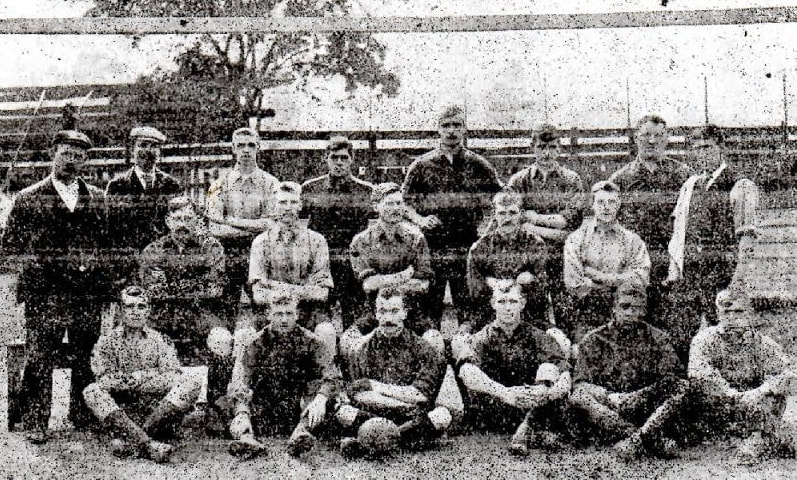
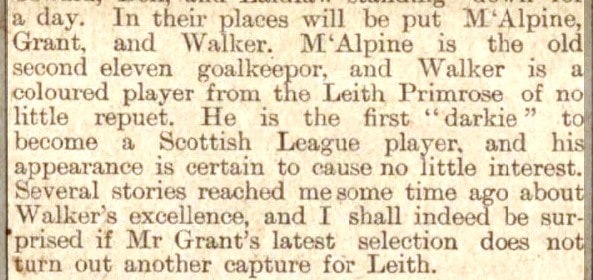
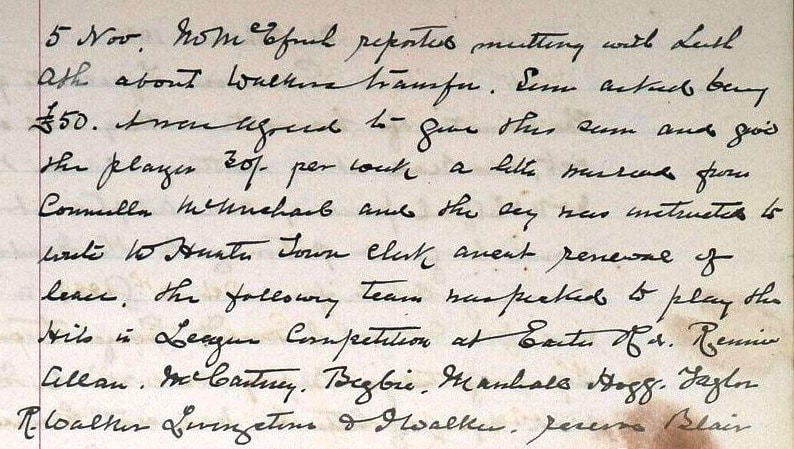
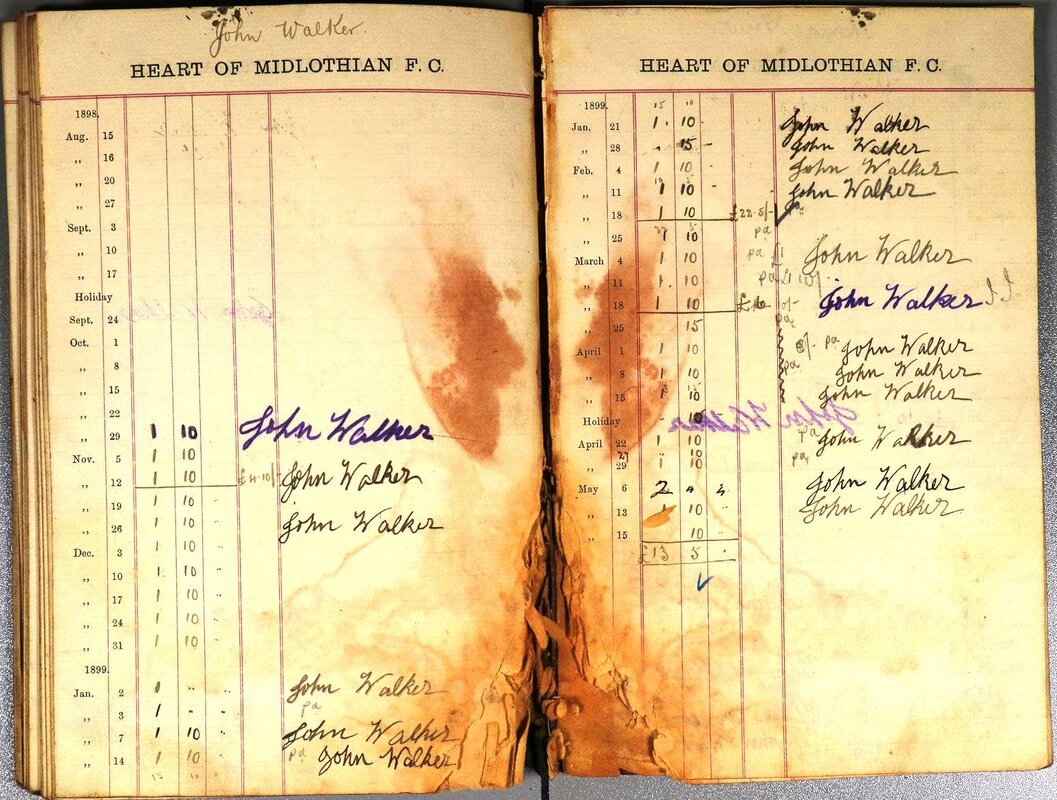
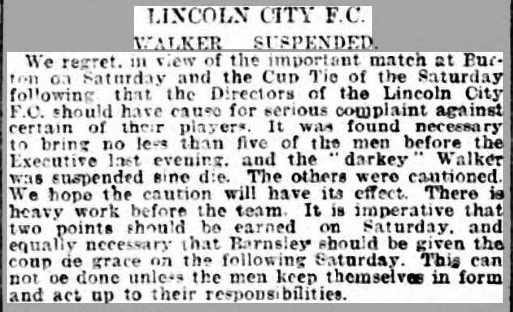
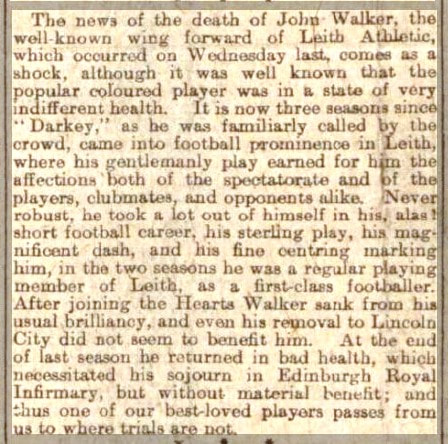

 RSS Feed
RSS Feed